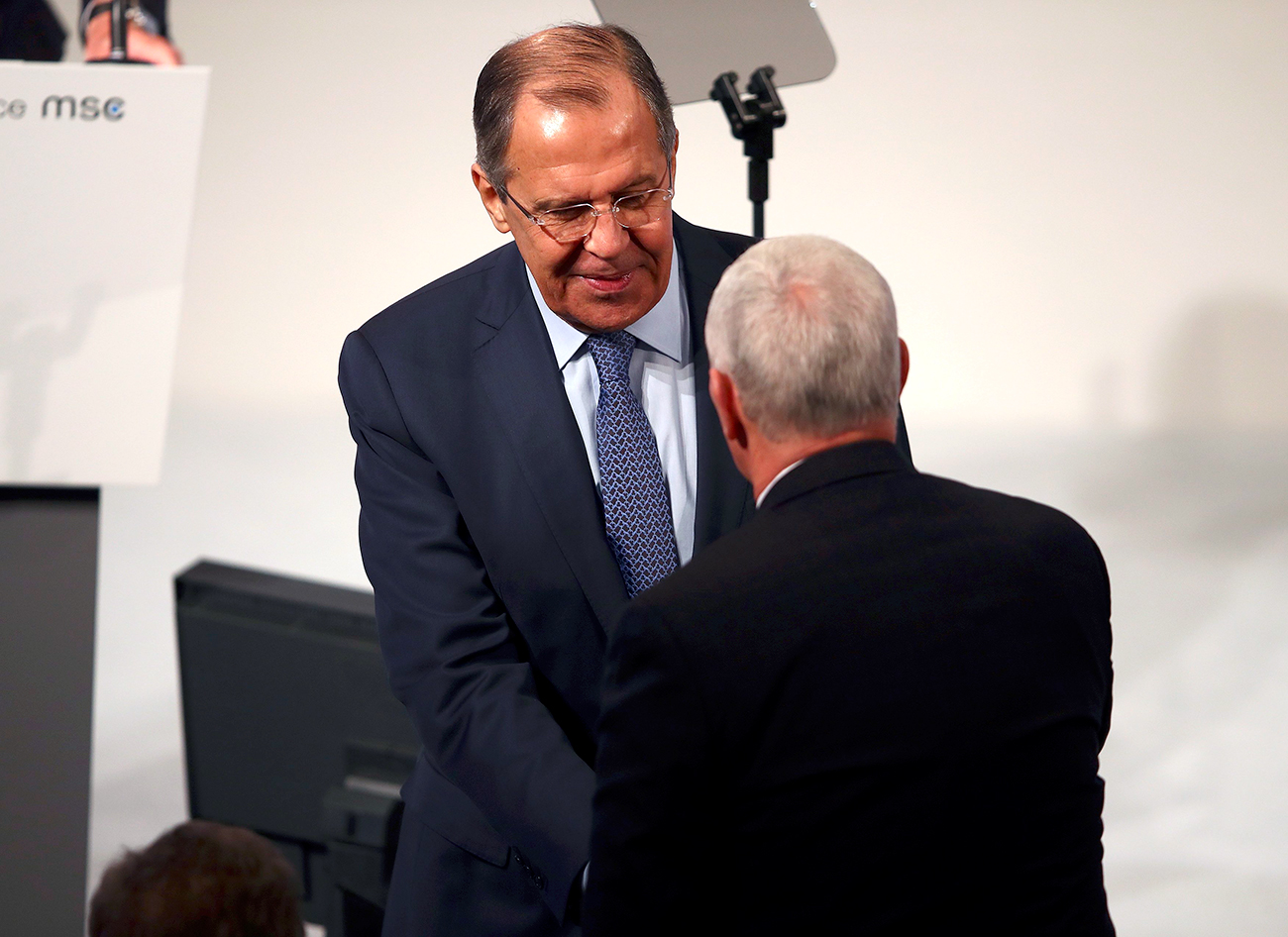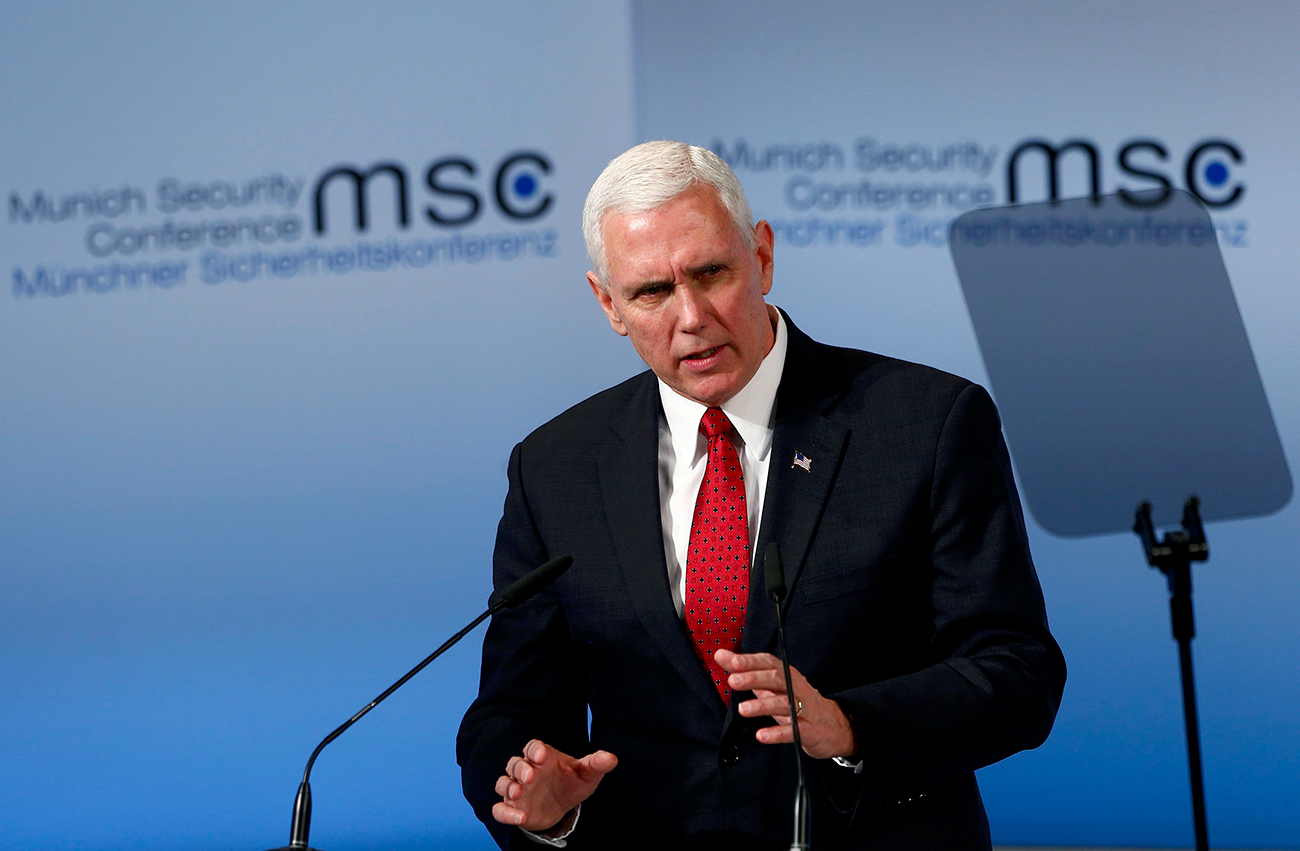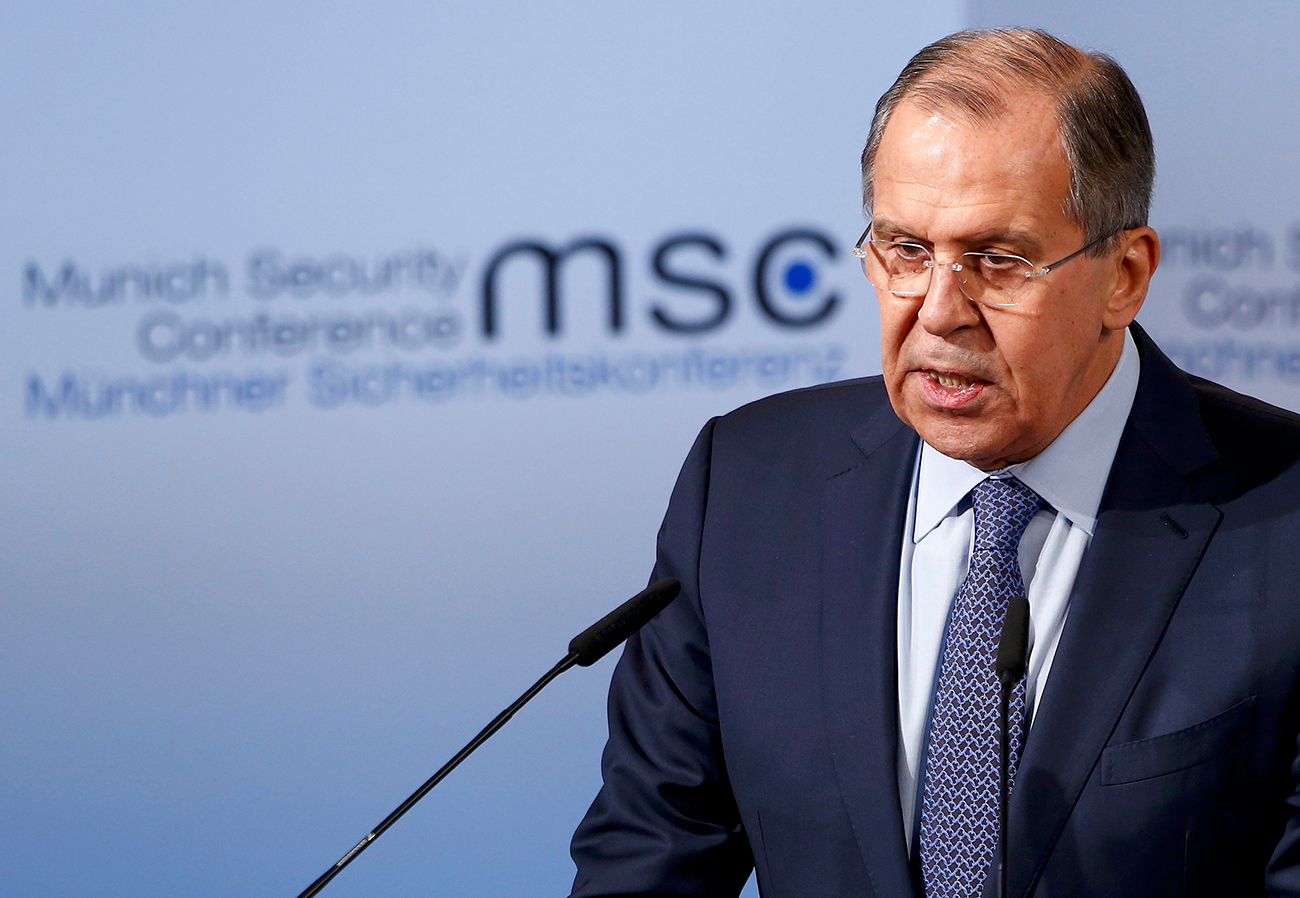
Russia's Foreign Minister Sergey Lavrov shakes hands with U.S. Vice President Mike Pence during the 53rd Munich Security Conference, Feb. 18, 2017.
ReutersRegular brainstorming sessions at the MSC matter. It is indeed a unique platform for debate on bread-and-butter topics of security. The University of Pennsylvania had good reasons to call it the “Best Think Tank Conference” in the world for the fourth time in a row.
This year the most intriguing and landmark issue was how sustainable, if at all, is the commitment of the Trump administration to serve as the arms-bearer and security provider for Europe.
Anxious European leaders were keen to be reassured that nothing like a Trump ‘Brexit’ is secretly in the making.
Trump’s conference task force - Vice President Mike Pence, Secretary of State Rex W. Tillerson, Homeland Security Secretary John Kelly and Defense Secretary Jim Mattis went to great lengths to comfort the Europeans.
 U.S. Vice President Mike Pence delivers his speech during the 53rd Munich Security Conference, Feb. 18, 2017 / Photo: Reuters
U.S. Vice President Mike Pence delivers his speech during the 53rd Munich Security Conference, Feb. 18, 2017 / Photo: Reuters
The New York Times wrote that they were presenting “traditional Republican national security orthodoxy of confronting Russia, supporting NATO and backing democratic institutions.”
“Today, tomorrow and every day hence, be confident that the United States is now and will always be your greatest ally,” Pence declared. “Be assured: President Trump and the American people are fully devoted to our transatlantic union.”
In his turn, James (“Mad Dog”) Mattis - who earned his nickname as a charismatic and tough military commander - raised the tone by saying, “the trans-Atlantic bond remains our strongest bulwark against instability and violence.”
And yet, an irritating reminder by Pence that only four NATO nations, besides the U.S., spend the agreed two percent of their GDP on defense, failed to find applause.
“The promise to share the burden of our defense has gone unfulfilled for too many for too long and it erodes the very foundation of our alliance,” Pence emphasized from the rostrum.
During questions following her speech, German Chancellor Angela Merkel informed the U.S. team that her government would up military expenditure by eight percent this year. She added that “we cannot do more”, thus casting doubt that the increase would be compatible with the NATO guidelines.
While the guardians of old world order sighed with relief, rejoicing over the admission by American emissaries that the transatlantic alliance is still valid, a sour aftertaste spoiled the party.
What Pence said mattered as much as what he left unsaid. He conspicuously omitted any reference to the European Union, the key element of unity and solidarity binding together versatile and often divergent nations of the Old Continent. It does not look like a speechwriter's lapse.
The annual MSC, founded in 1963, was originally predominantly a “transatlantic family gathering” only later acquiring a more global dimension, given the emergence of new security challenges.
 Russia's Foreign Minister Sergey Lavrov delivers his speech during the 53rd Munich Security Conference, Feb. 18, 2017 / Photo: Reuters
Russia's Foreign Minister Sergey Lavrov delivers his speech during the 53rd Munich Security Conference, Feb. 18, 2017 / Photo: Reuters
With the endgame of the Syrian war on everybody’s mind, rumors that Trump might indeed place GI boots on the ground was an added dimension to the deliberations. A similar high-risk reversal is the likelihood that Trump will pull out of the Iranian nuclear deal and fan hostilities with Tehran.
In an interview with CNN's Christiane Amanpour, Iranian Foreign Minister Mohammad Javad Zarif dismissed the probability that the U.S. would unilaterally scrap the deal that took two years to hammer out and was the result of sound compromises.
“I believe everybody, including experts in the United States, know this was the best deal possible for all concerned, not just Iran but the U.S. too,” Zarif said. “It was a triumph of diplomacy over coercion, because coercion doesn't work any more.”
The 57-year old seasoned Iranian diplomat also warned against “foreign troops in Arab territory” which would be a gift for extremists that would “rally behind and gain new fighters from disenfranchised youth.” He took the words out of Trump’s mouth repeating that the American occupation of Iraq and the reckless policies of the then-President Barack Obama created ISIS.
In some way, Zarif’s comments came as a timely reminder for NATO and the transatlantic alliance that when addressing regional security concerns far away a country's borders, the interests of local actors should be taken into consideration.
The Kremlin’s strategy planners have a hard task in deciphering the mixed messages coming out of Washington these days.
On the one hand, Pence addressing the MSC made it clear that the new administration defies what he called “Russian efforts to redraw international borders by force” without delineating what he meant.
The one-time conservative radio and television talk show host (Pence hosted shows between 1994-99) was referring to the dispatch of Russian "polite people” in uniform to ensure that violence or subversive acts did not interfere with the 2014 referendum in Crimea that resulted in a popular vote in the former Ukrainian Black Sea peninsula to be incorporated in Russian territory.
On the other hand, while drawing certain red lines in relations between the two nations, Pence, ex-lawyer and stringent Tea Party advocate, would not rule out altogether a rapprochement with Moscow, as suggested by Trump.
“The United States will continue to hold Russia accountable, even as we search for new common ground”, Pence said.
Earlier, Mattis suggested that the U.S. should engage Russia from a position of force. It triggered a rebuff from Russian Defense Minister Sergei Shoygu, who said such a heavy-handed and hard-line approach to dealing with Russia was counterproductive.
Later, visiting NATO headquarters in Brussels, Mattis assuaged fears of the European allies saying there would be no ‘comradeship-in-arms’ with Russia defined as the main security threat to the U.S.
“We are not in a position right now to collaborate on a military level,” the retired Marine General said.
Mattis spelled out his tough stance, which was somewhat different from Trump’s complacent rhetoric just hours after President Vladimir Putin had called on the FSB, Russia's national security agency, for active cooperation with the American intelligence community in the two countries' common struggle against terrorism.
“Restoring dialogue with the special services of the United States and other NATO members is in our mutual interest,” Putin said.
All these contrasting statements coincided with the first meeting in almost three years between Gen. Joseph F. Dunford Jr, another Marine Corps General and currently the 19th Chairman of the Joint Chiefs of Staff, and his Russian counterpart.
The confusing smoke signals are a cause for speculation: Is Trump’s ‘mixed salad’ team truly in disarray as claimed by Clinton’s spin doctors? Is it evidence of a spontaneous testing of foreign policy options? Or is it a premeditated carrot-and-stick policy to soften up Moscow?
Addressing the MSC, Russia's foreign minister, Sergey Lavrov, effectively set out pre-conditions for bettering relations with the U.S. and the West in general. The Kremlin would accept nothing less than "pragmatic relations and mutual respect, understanding our special responsibility for global stability.”
It seems that this year's MSC brought a disquieting sense of déjà vu that will embolden conservative factions within the Russian leadership that are as skeptical about Trump as hard-line Europeans.
Vladimir Mikheev is a freelance commentator for Russia Beyond The Headlines. His opinion does not reflect the position of RBTH or its staff.
If using any of Russia Beyond's content, partly or in full, always provide an active hyperlink to the original material.
Subscribe
to our newsletter!
Get the week's best stories straight to your inbox